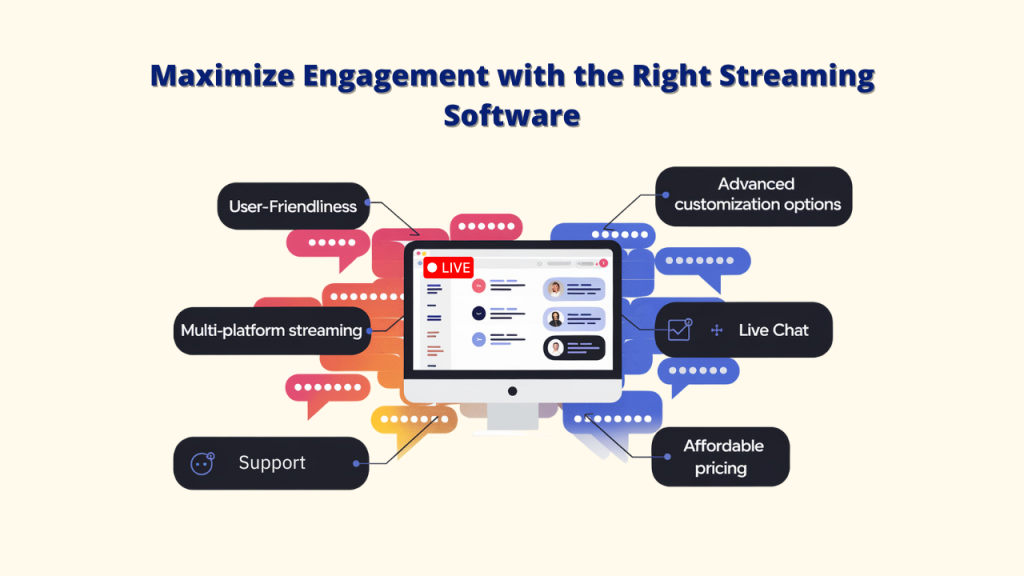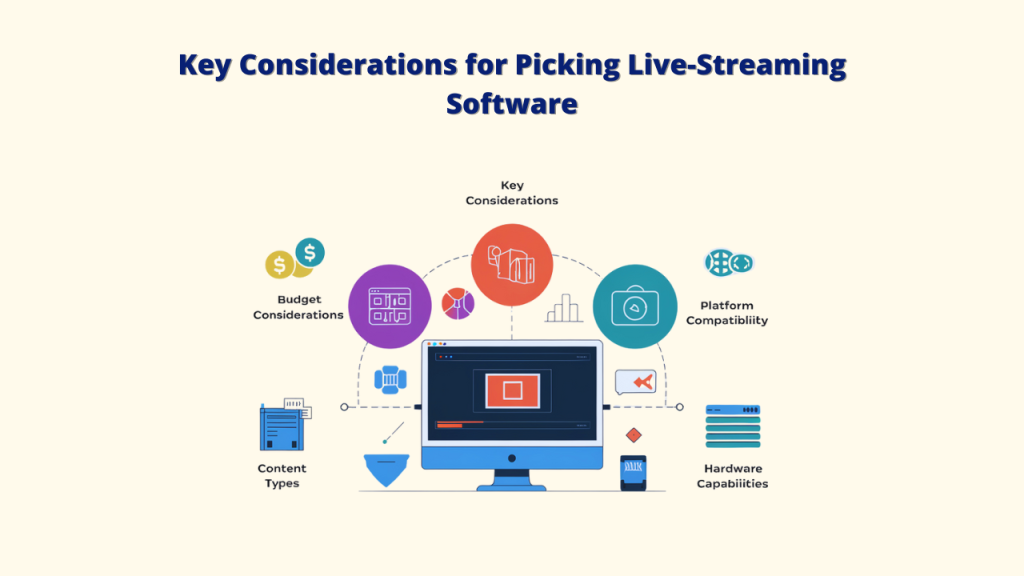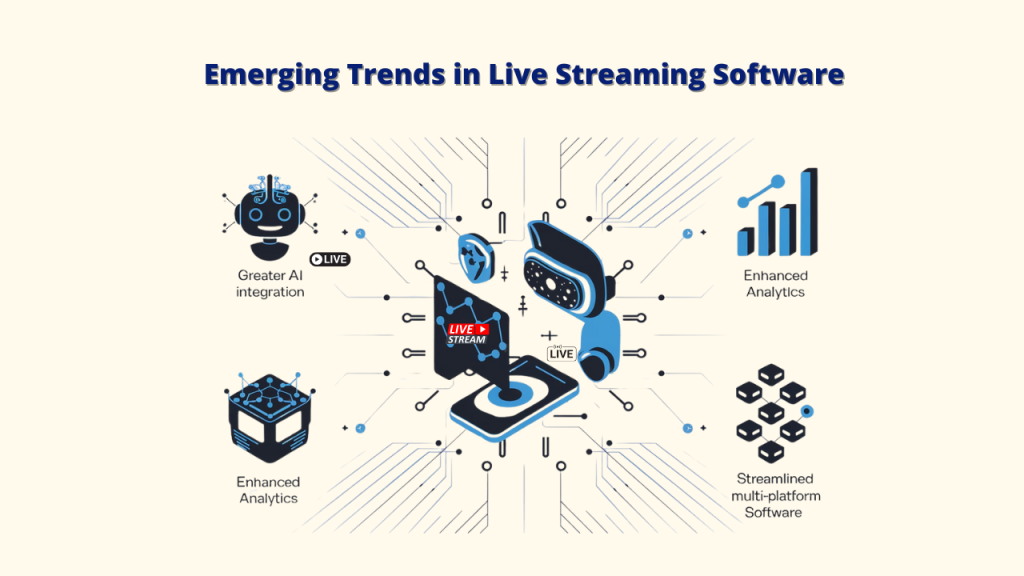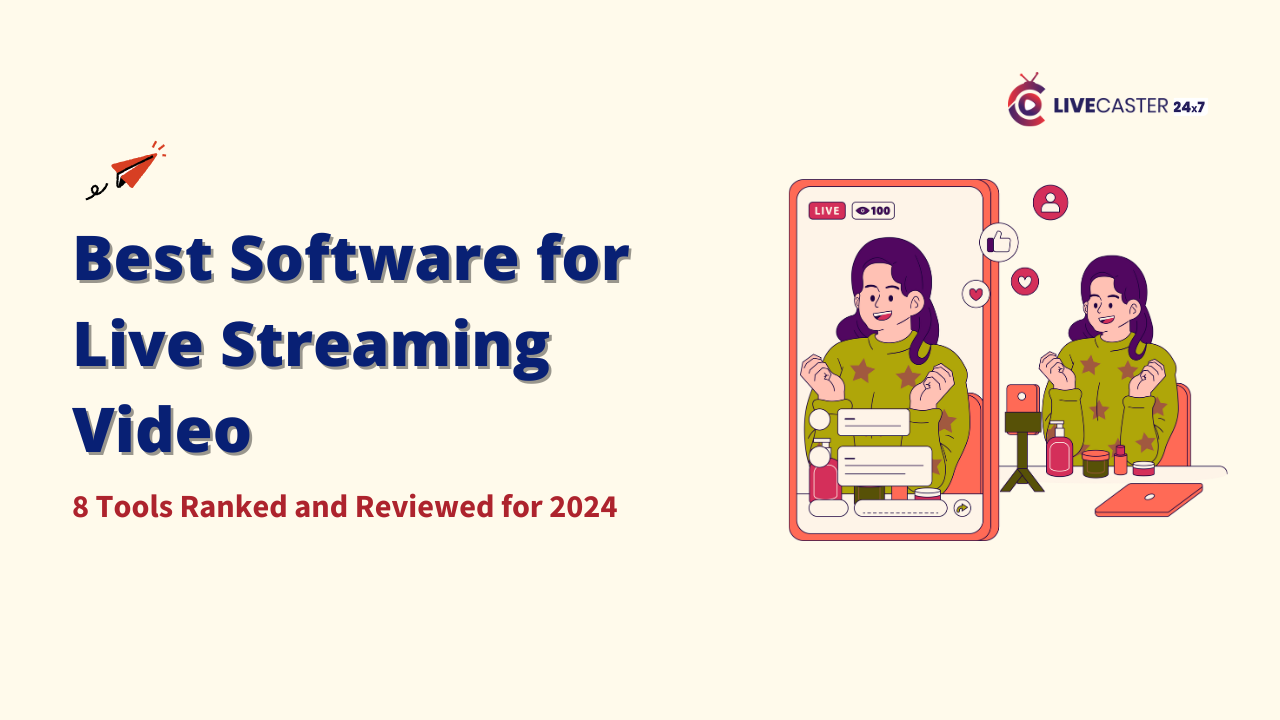Using the best software for live streaming video is one of the most effective ways to build a stronger connection with your audience. Whether you’re aiming to grow your brand or improve the quality of your streams, selecting the right live streaming tool is crucial for professional video production.
Live streaming has changed how you consume content, engage with audiences, and run businesses. Whether you’re a gamer, broadcaster, business owner, or educator, using the right live streaming software is key to delivering smooth, high-quality streams. A major question, though, is which is the best software for live streaming video.
The live streaming video industry is expanding rapidly, projected to grow by 21% by the end of 2024, driven by cloud-based streaming solutions. With an overwhelming number of new live streaming platforms and every major social network offering this service, picking the best software for live streaming video that suits your needs can be challenging.

Choosing the best software for live streaming video is vital for ensuring high-quality broadcasts. It’s important to select a tool that not only fits your budget but also offers the right features to engage viewers, such as live chat, multiple streaming platforms, and real-time analytics.
This guide offers features, customer reviews, pricing, and a checklist for choosing live-streaming software. By the end, you’ll know how to select the best option for your needs and stream like a pro.
In this detailed guide, you will review the 8 best live streaming software options for 2024, helping you find the right tool to improve your streaming experience.
The Importance of the Best Software for Live Streaming Video

Picking the right live-streaming software is essential for producing high-quality broadcasts. The right software offers valuable features and fits your specific goals, whether you need user-friendly tools, advanced customization options, support for streaming on multiple platforms, or cost-effective solutions.
Additionally, the right software helps create a more seamless and engaging experience for your audience through live chat, boosting viewer interaction and retention. By picking the right tool, you ensure your broadcasts stand out, attract more viewers, and grow your brand.
Evaluate these tools using several key criteria:
- User-friendliness
- Features
- Integrations
- Pricing
- Support
Best Software for Live Streaming Video in 2024
1. Livecaster: A Simple Yet Powerful Streaming Platform

Overview:
Livecaster is one of the best software for live streaming video in 2024, designed for users who need a simple yet powerful solution. Its user-friendly interface allows for seamless broadcasting across multiple platforms, making it an excellent choice for creators who value ease of use and quality.
Key characteristics:
- Live streaming video can be pre-recorded
- Customizable Overlays
- Video Conversion Included
- Multi-platform streaming
- Real-time audience analytics
Best For:
Creators who want to stream live and engage their audience effectively.
Pros and Cons
Pros:
- Simple user interface makes it easy for anyone to start live video streaming.
- Easy streaming on all platforms.
- Cloud-based systems decrease hardware demands.
Cons:
- Advanced features are limited.
Pricing: $32 one-time offer + free upgrades: Buy Now
2. Switcher Studio: A Versatile Live Streaming Platforms

Overview :
Switcher Studio is a well-balanced live-streaming solution for new and established creators, perfect for live video streaming. With the ability to stream from up to 9 iOS phones as various sources, conduct live polls, and monetize through subscriptions, donations, tips, and gated content, you’ll find it difficult to desire anything more.
Key characteristics:
- iOS-based multi-camera streaming
- Real-time editing and switching
- Integration with major streaming platforms
Best For:
Perfect for content creators, small businesses, and event organizers who need a portable solution.
Pros and Cons:
Pros:
- Web and mobile app
- Multi-platform streaming
- Intuitive interface
Cons:
- Available only on iOS devices.
- Full functionality may require multiple iPhones/iPads.
Pricing: Starting at $99/month.
3. Streamlabs OBS: Enhanced Streaming Made Easy

Overview:
Streamlabs OBS (now known as Streamlabs Desktop) expands on the core features of OBS Studio, providing extra tools designed specifically for streamers who want to stream live. It combines different services and features to improve the overall streaming experience.
Best for:
Perfect for new streamers and those who prefer an all-in-one solution with built-in monetization features.
Pros and Cons
Pros:
- Simple to set up and use
- Tools for integrated monetization.
- Setting backups in the cloud
Cons:
- OBS Studio uses a lot of resources.
- A paywall protects certain advanced features.
Pricing: Paid plans start at $19/month.
4. Restream: A Powerful Multiplatform Streaming Tool

Overview:
Restream is an effective tool that lets you broadcast your live streams to several platforms at once. For streamers looking to increase their audience size, it is a crucial tool.
Key characteristics:
- Multi-platform streaming
- Chat aggregation
- Analytics across platforms
- Scheduling and Automation
Best For:
Perfect for companies and content producers who want to reach a wider audience by simultaneously streaming to several platforms.
Pros and Cons
Pros:
- Comprehensive support for various platforms
- An easy-to-understand interface
- Complete Analytics
Cons:
- Features of higher tiers may be costly.
- Less personalization
Pricing: Paid plans begin for $16/month.
5. vMix: Comprehensive Live Production and Streaming Software

Overview:
vMix is a versatile live production and streaming software designed for both beginners and experts. It provides a wide range of tools for creating high-quality live video productions.
Key characteristics:
- Advanced video mixing technology
- Support for 4K video.
- Switching and mixing live
- Integrated tool for titling
Best For:
Perfect for event producers, professional broadcasters, and businesses requiring high production value and advanced features.
Pros and Cons
Pros:
- Full set of features
- Excellent capacity for production
Cons:
- A steep learning curve.
- Costlier than alternative options
Pricing: The starting price is $60/month.
6. XSplit Broadcaster: Good Choice for Gamers and Streamers

Overview:
XSplit Broadcaster is a popular streaming tool favored by gamers and eSports enthusiasts. It offers robust features and an intuitive interface, making it a versatile choice for various streaming needs.
Key characteristics:
- Scene transitions
- Built-in tools for editing
- Plugin integration
- Integrated conversation.
Best For:
Perfect for gamers and eSports streamers seeking easy-to-use software with powerful streaming and recording capabilities.
Pros and Cons
Pros:
- An intuitive interface
- Recording and streaming in excellent quality
- Wide support for plugins
Cons:
- It can be expensive to use the subscription-based model.
- A few features are only available with more expensive plans.
Pricing: Paid plans start at $36/month.
7. StreamYard: Easy-to-Use Browser-Based Live Streaming Tool

Overview:
StreamYard is a live streaming tool that operates directly in your browser, focusing on simplicity and user-friendliness. It’s ideal for hosting live interviews, webinars, and virtual events without requiring complicated setups.
Key characteristics:
- A simple method for inviting guests.
- No need to install software.
- Options for brand customization
Best For:
Perfect for podcasters, educators, and businesses conducting live interviews, webinars, and virtual events.
Pros and Cons
Pros:
- No installations are needed.
- Excellent for collaborative streams.
- Great for interviews.
Cons:
- less personalization than desktop programs
- Requiring a steady internet connection.
Pricing: Paid plans start at $20/month.
8. Wirecast: Professional Live Streaming Software

Overview:
Wirecast is a high-quality live streaming software created by Telestream, ideal for professional video recording. It provides an extensive range of tools for producing top-notch live broadcasts, making it popular among broadcasters and content creators alike.
Key characteristics:
- Integrated titling tool
- Live Encoding
- ISO recording of individual sources
- Integration with Hardware
Best For:
Perfect for professional broadcasters, live event producers, and businesses requiring top-tier streaming capabilities.
Pros and Cons
Pros:
- Full professional features.
- Excellent output from production.
- Reliable performance.
Cons:
- Costly in comparison to other choices.
- Beginners face a steep learning curve.
Pricing: Paid plans start at $29.08/month.
Comparison Table of the Best Software for Live Streaming Video
| Software | Main features | Starting Price | Best for |
| Livecaster | Pre-recorded livestream, Multi-platform | From $32 | Professional streamers and creators |
| Switcher Studio | iOS-based, Multi-camera | From $99/month | Mobile content creators |
| Streamlabs OBS: | User-friendly, Gaming overlays | From $19/month | Beginner and intermediate streamers can greatly benefit from using Prism Live Studio for their broadcasts. |
| Restream | Multi-platform, Chat aggregation | From $16/month | Multi-platform streamers |
| vMix | Professional mixing, 4K support | From $60/month | Professional broadcasters |
| XSplit Broadcaster | Scene transitions, Plugin support | From $36/month | Intermediate streamers |
| StreamYard | Browser-based, Guest management | From $20/month | Podcasters, Talk shows |
| Wirecast | Multi-camera, ISO recording | From $29.08/month | Large organizations |
Selecting the Best Software for Live Streaming

1. Considerations regarding budget:
When choosing live streaming software, it’s important to look at more than just the upfront cost. Think about both immediate expenses and long-term benefits:
- One-Time Purchase vs. Subscription: To determine which provides better value over the long term, take into account the total cost: one-time purchases or monthly/annual subscriptions.
- Feature Tiers: Check if you need advanced features in higher-priced tiers or if a basic package will meet your needs.
- Hidden Costs: Watch out for extra costs like plugins, add-ons, or hardware upgrades needed to fully use the software.
Keep in mind that the most expensive choice isn’t always the best. Livecaster offers a good balance of price and usability, along with tools to track your stream’s performance through insights and analytics.
2. Must have technical skills:
Your comfort level with technology should play a significant role in your choice:
- Beginner-friendly: New streamers should choose software with easy interfaces, drag-and-drop features, and good tutorials.
- Advanced options: Experienced users may prefer more customizable software with advanced controls.
- Learning curve: Consider the time needed to learn complex tools, which may offer more flexibility but take longer to master.
Knowing your skill level helps you choose a suitable option. Livecaster is an excellent choice, enabling continuous live streams by looping your videos, making it ideal for showcasing content around the clock on platforms like YouTube Live.
3. Compatibility with streaming platforms.
Ensure the software you choose works seamlessly with your preferred streaming platforms:
- Multi-platform support: Choose software with built-in multi-streaming if you want to stream on multiple platforms at once.
- Platform-specific features: If you focus on one platform, consider software that offers optimized features for it.
- API integration: Ensure the software can connect with your platform’s API for better stream management and chat moderation.
Tools like Livecaster are compatible with a variety of social media platforms, including YouTube, Facebook, Instagram, Twitch, TikTok, and LinkedIn.
4. Considerations about content types
Specific features might be needed for different kinds of content:
- Gaming: Choose software with game capture, overlays, and platform integration.
- Business/Education: Look for presentation tools, screen sharing, and interactive features.
- Entertainment: Opt for advanced scene switching, multi-camera support, and creative effects.
- Talk Shows/Podcasts: Prioritize audio mixing and guest management features.
Select software that aligns with your content preferences. You don’t always have to go live in real-time; you can pre-record your videos, edit them, and then stream them as live broadcasts using Livecaster.
5. Capabilities of the hardware
Make sure the software you choose is compatible with your hardware.
- Device Compatibility: Make sure your cameras, mics, and other gear work with the software.
- Mobile Streaming: For mobile creators, look for apps or mobile device support.
- System Requirements: Check the minimum and recommended specs to ensure smooth performance.
Remember, many software options offer free trials. Feel free to test out a few before making your final choice.
Future Trends in Live Streaming Software

Live streaming software evolves alongside technological advancements. The following are some new developments to be aware of in the upcoming years:
A. Greater AI Integration
Artificial Intelligence will increasingly help automate tasks such as switching scenes, moderating content, and interacting with viewers in a personalized way.
B. Virtual and Augmented Reality
Incorporating VR and AR elements will create more engaging streaming experiences, particularly for gaming and virtual events. With Livecaster, you can pre-record your videos, refine them, and then stream them live.
C. Enhanced Analytics
More advanced analytics tools will provide deeper insights into how viewers behave, engage, and prefer, allowing streamers to customize their content more effectively. With Livecaster, you can track your livestream performance using insights and analytics, making it an excellent choice.
D. Streamlined Multi-Platform Integration
Upcoming software will make multi-platform streaming easier with smoother workflows and less lag. With Livecaster, you can convert your existing videos into a format that works well for live streaming.
Conclusion
In 2024, using the best software for live streaming video is essential for content creators, businesses, educators, and professionals. As the demand for engaging and high-quality video content continues to grow, selecting the right live streaming software becomes even more critical. The ideal tool should offer ease of use, compatibility with multiple platforms, essential features like real-time analytics, and reasonable pricing to ensure seamless and professional broadcasts.
For beginners, prioritizing simplicity and ease of use is essential, while seasoned streamers may seek advanced customization and production features. Livecaster is an excellent option, allowing you to leverage live streaming on social media, even with pre-recorded videos. It enables you to upload and broadcast your polished content as live streams, helping you connect with your audience without the stress of real-time broadcasting.
Ultimately, the right live-streaming software should help you connect with your audience in a dynamic and meaningful way, free from technical challenges. As live streaming technology continues to advance, staying updated on new features will ensure your content remains impactful and professional.


